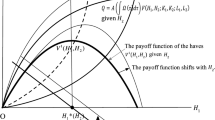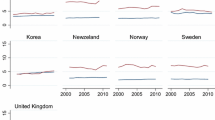Abstract
There exists a large literature which shows that public education is favorable for growth because it increases the level of human capital and at the same time it tends to produce a more even income distribution. More egalitarian societies are also associated with less social conflicts, and individuals have a lower tendency to report themselves happy when inequality is high. Therefore, it is important to study the reasons why the elite opposes the development of a strong public education system. It might be that education is related to social status and a strong public education system might threaten the elite’s political power. We show that one aspect of social status is the specialization of skilled workers in high-paid jobs and the abundance of unskilled workers in the production of cheap “home goods” in the market, such as painting and cleaning a house, babysitting, and/or cooking. We emphasize the role of general equilibrium price adjustments to show that depending on the level of inequality, the elite might prefer an economy with a positive and “high” cost of education than an economy where skills are freely provided. We show that this result goes through even if the skilled wage is not directly affected by the ratio of skilled to unskilled workers. We also provide empirical evidence consistent with our theory.
Similar content being viewed by others
References
Acemoglu D.: The Form of Property Rights: Oligarchic vs. Democractic Societies. Mimeo Cambridge, MIT (2005)
Acemoglu D., Robinson J.: Why did the west extend the franchise? Democracy, inequality, and growth in historical perspective. Q J Econ 115, 1167–1199 (2000)
Aghion P., Bolton P.: A theory of trickle-down growth and development. Rev Econ Stud 64, 151–172 (1997)
Alesina A., DiTella R., MacCulloch R.: Inequality and happiness: are Europeans and Americans different?. J Public Econ 88, 2009–2042 (2004)
Alston L., Ferrie J.: Paternalism in agricultural labor contracts in the U.S. South: implications for the growth of the welfare state. Am Econ Rev 83, 852–876 (1993)
Banerjee A., Newman A.: Occupational choice and the process of development. J Polit Econ 101, 274–298 (1993)
Banerjee, A.: Inequality and investment. In: Ferreira, F., Walton, M. (eds.) World Development Report 2006. World Bank, Washington, DC (2006)
Benhabib J., Przeworski A.: The political economy of redistribution under democracy. Econ Theory 29, 271–290 (2006)
Benhabib J., Rogerson R., Wright R.: Homework in macroeconomics: household production and aggregate fluctuations. J. Pol. Econ. 99, 1166–1187 (1991)
Bernabou, R.: Inequality and growth. In: Bernanke, B., Rotemberg, J. (eds.) NBER Macroeconomics Annual, pp. 11–74 (1996)
Bernabou, R.: Inequality, technology, and the social contract. In: Aghion, P., Durlauf, S.N. (eds.) Handbook of Economic Growth, vol. 1B, pp. 1595–1638 (2005)
Bourguignon F., Verdier T.: Oligarchy, democracy, inequality, and growth. J Dev Econ 62, 285–313 (2000)
Cavalcanti T., Tavares J.: Assessing the “Engines of Liberation”: home appliances and female labor force participation. Rev Econ Stat 90, 81–88 (2008)
Cavalcanti, T., Tavares, J.: Women prefer larger governments: growth, structural transformation and government size. Econ Inq (forthcoming) (2009)
Cortes P.: The effect of low-skilled immigration on U.S. prices: evidence from CPI data. J Polit Econ 116, 381–422 (2008)
Cortes, P., Tessada, J.: Cheap Maids and Nannies: How Low-Skilled Immigration is Changing the Labor Supply of High-Skilled American Women. Mimeo, University of Chicago (2008)
de La Croix D., Doepke M.: Inequality and growth: why differential fertility matters. Am Econ Rev 93, 1091–1113 (2003)
de La Croix D., Doepke M.: To segregate or to integrate: education politics and democracy. Rev Econ Stud 76, 597–628 (2009)
Doepke M.: Accounting for fertility decline during the transition to growth. J Econ Growth 9, 347–383 (2004)
Doepke M., Zilibotti F.: The macroeconomics of child labor regulation. Am Econ Rev 95, 1492–1524 (2005)
Easterly W.: Inequality does cause underdevelopment: insights from a new instrument. J Dev Econ 85, 755–776 (2007)
Engerman S.L., Sokoloff K.L.: The evolution of suffrage institutions in the new world. J Econ His 65, 891–921 (2005)
Fava A.C.P., Arends-Kuenning M.: Maid’s Services as a Substitute Factor in Home-Production. University of Illinois, Mimeo (2008)
Freeman, R., Oostendorp, R.H.: Wages Around the World: Pay Across Occupations and Countries, NBER Working Paper 8058 (2000)
Galor O., Moav O.: Das human-kapital: a theory of the demise of the class structure. Rev Econ Stud 73, 85–117 (2006)
Galor O., Zeira J.: Income distribution and macroeconomics. Rev Econ Stud 60, 35–52 (1993)
Greenwood J., Hercowitz Z.: The allocation of capital and time over the business cycle. J. Pol. Econ. 99, 1188–1214 (1991)
Greenwood J., Seshadri A.: Technological progress and economic transformation. In: Aghion, P., Durlauf, S.N. (eds) Handbook of Economic Growth, vol. 1B, pp. 1225–1273. Elsevier, Amsterdam (2005)
Greenwood J., Seshadri A., Yorukoglu M.: Engines of liberalization. Rev Econ Stud 72, 109–133 (2005)
Grossman H., Kim M.: Educational policy: Egalitarian or Elitist?. Econ Polit 15, 225–246 (2003)
Heston, A., Summers R., Aten, B.: Penn World Table Version 6.2, Center for International Comparisons of Production. Income and Prices at the University of Pennsylvania (2006)
Kremer M., Watt S.: The Globalization of Household Production. University of Harvard, Mimeo (2006)
Lindert P.: Voice and growth: was Churchill right?. J Econ His 63, 315–350 (2003)
Lindert P.: Growing Public: Social Spending and Economic Growth Since the Eighteenth Century. Cambridge University Press, Cambridge (2004)
Ljungqvist L.: Economic undervelopment: the case of missing market for human capital. J Dev Econ 40, 219–239 (1993)
Mayda A.M.: Who is against immigration? A cross-country investigation of individual attitudes toward immigrants. Rev Econ Stat 88, 510–530 (2006)
Mokhtari M., Rassekh F.: The tendency towards factor price equalization among OECD countries. Rev Econ Stat 71, 636–642 (1989)
Moav O.: Cheap children and the persistence of poverty. Econ J 115, 88–110 (2005)
Mookherjee D., Ray D.: Is Equality Stable?. American Economic Review Papers and Proceedings, vol. 92, 253–259 (2002)
Mookherjee D., Ray D.: Persistent inequality. Rev Econ Stud 70, 369–393 (2003)
Olson M.: The Rise and Decline of Nations: Economic Growth, Stagflation, and Social Rigidities. Yale University Press, New Haven (1982)
Parente S., Prescott E.: Monopoly rights: a barrier to riches. Am Econ Rev 89, 1216–1233 (1999)
Parente S., Prescott E.: Barriers to Riches. Cambridge, MIT (2000)
Parente S., Rogerson R., Wright R.: Homework in development economics: household production and the wealth of nations. J Polit Econ 108, 680–687 (2000)
Ramey V.A.: Time spent in home production in the twentieth-century United States: new estimates from old data. J Econ His 69, 1–47 (2009)
Ray D.: On the dynamics of inequality. Econ Theory 29, 291–306 (2006)
Ray D., Streufert P.: Dynamic equilibria with unemployment due to undernourishment. Econ Theory 3, 61–85 (1993)
Ríos-Rull J-V.: Working in the market, working at home, and the acquisition of skills: a general equilibrium approach. Am Econ Rev 83, 893–907 (1993)
Sokoloff K., Engerman S.: Institutions, factor endowments, and paths of development in the new world. J Econ Perspect 14, 217–232 (2000)
Trefler D.: International factor price differences: Leontief was right. J Polit Econ 101, 961–987 (1993)
United Nations.: Human Development Report 2007/2008: Fighting Climate Change. New York: Palgrave Macmillan (2007)
Zhu S.C., Trefler D.: Trade and inequality in developing countries: a general equilibrium analysis. J Int Econ 65, 21–48 (2005)
Author information
Authors and Affiliations
Corresponding author
Additional information
We owe many thanks to Stephen L. Parente for helpful discussion, and Anne P. Villamil, an anonymous referee, and an associate editor for valuable comments. We are also indebted to Alexandre Rands de Barros, Márcio Corrêa, and Paulo Amilton Leite Filho for suggestions in an earlier version of this article. Tiago Cavalcanti is thankful to Conselho Nacional de Desenvolvimento Científico e Tecnológico (CNPq, Brazil) for financial support. This article was written while Tiago Cavalcanti was visiting the Department of Economics at Purdue University. He is thankful to the people at Purdue University, especially Gabriele Camera, for their hospitality.
Rights and permissions
About this article
Cite this article
Alexopoulos, J., de V. Cavalcanti, T.V. Cheap home goods and persistent inequality. Econ Theory 45, 417–451 (2010). https://doi.org/10.1007/s00199-009-0495-4
Received:
Accepted:
Published:
Issue Date:
DOI: https://doi.org/10.1007/s00199-009-0495-4




